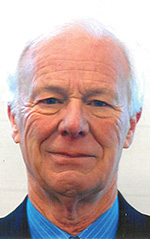Early Days in the Operations Center
Reflections
BY JONATHAN B. RICKERT
The State Department Operations Center was established in 1961 after President John F. Kennedy was unable to reach anyone at the department by phone after hours during the Cuban Missile Crisis.
Since then, the office has expanded from a small, relatively primitive operation to the much larger, more complex, and high-tech facility that it is today. The primary purpose remains the same, however: to be the round-the-clock communications and crisis management center for the State Department, monitoring world events as well as keeping the Secretary and other principals informed and connected to each other and to world leaders.
My first Foreign Service assignment, in September 1962, was a one-year stint in the Ops Center. At that time, developments in Vietnam were of great interest to the department principals and increasingly were the Ops Center’s top substantive priority. We were the eyes and ears of the Seventh Floor—not generally an action office per se but one that facilitated the work of many others. Our coordination with the Department of Defense and CIA was also growing rapidly, due primarily to the demands of this conflict.
Daytime staffing on weekdays consisted of the director, deputy director, senior watch officer (SWO), associate watch officer (AWO), a military representative (MilRep), and a few clerks and the like. Because its crisis management role was just beginning, the office had few staff, little infrastructure, and no experience for that purpose.
The main daytime duties were to screen immediate or higher precedence cable traffic and to alert action offices. We also handled calls from within the department, other agencies, and the general public.
As one can imagine, our technology was Stone Age by today’s standards—landline phones (including one bulky STU 2 “scrambler” phone for classified calls), AP and Reuters news tickers, and a TV set. Cable news did not yet exist.
Evening and night coverage normally consisted of just three FSOs—an SWO, AWO, and an editor who prepared the daily Top Secret cable summary for department principals. Watch standers like me worked two day shifts, two evenings, and two nights or “mids,” followed by three days off.
The Ops Center had a small, windowless bedroom, with two bunk beds. It was used occasionally during night shifts for naps by one of the three FSOs on duty if there was absolutely nothing going on. He—and in those days it was always a he—could easily be awakened if things heated up suddenly.
Although the work we did in the Ops Center was serious and important, it could also be diverting. One time, Secretary Dean Rusk came in midday to take an encrypted phone call, something he could not do then in his own office.
SWO Norman Getsinger was seated at his desk and had just started eating an egg salad sandwich. He quickly vacated his chair as the Secretary approached but left the sandwich on the desktop. Rusk chose to sit casually on the desk while taking his call, failing to notice the sandwich and depositing his derriere directly on it.
As Norman and I looked on silently but in horror, egg salad oozed out from under the Secretary. He completed his call, graciously thanked us, and returned to his own office. When he noticed the damage to his trousers, I do not know, but we never heard back from him.
When things were quiet, I benefited from hearing about many SWOs’ World War II experiences. One also gave me the following counsel about FS assignments. In his somewhat jaded telling, there were three important factors—the job, the place, and the people.
According to him, if you got one of the three to your liking, you should be satisfied, two and you should be delighted, and if all three, don’t believe it because it couldn’t be true. An exaggeration certainly but, in my subsequent experience, containing more than a kernel of truth.
My year in the Ops Center passed quickly, and soon it was time to move on as part of a “rotational” first assignment. It was a great introduction to the State Department, at a high level, and provided enough experiences and memories to last for the remainder of my 35-year Foreign Service career and beyond.
When sharing or linking to FSJ articles online, which we welcome and encourage, please be sure to cite the magazine (The Foreign Service Journal) and the month and year of publication. Please check the permissions page for further details.


